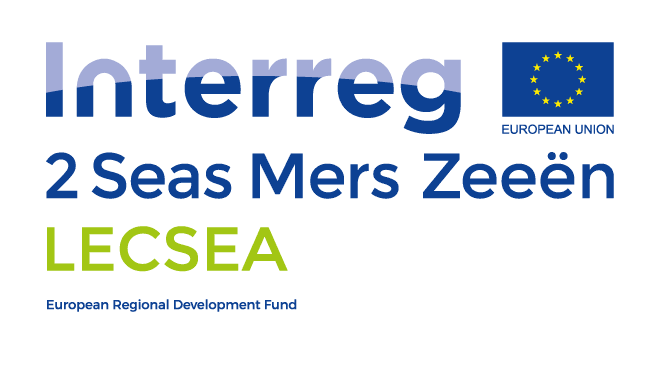Interreg 2 Seas - LECSea

Introduction
LECSea (Local Energy Communities for the 2 Seas region) is an Interreg 2 Seas project under the programme priority ‘Technological and social innovation’. It aims to increase delivery of innovation in the Offshore Renewable Energy sector (ORE), supported through 2 specific objectives.
The LECSea project, coordinated by Intermunicipal Association Leiedal (BE), brings together 10 partners from 4 European countries to stimulate the development of energy communities (ECs) in the 2 Seas region through new cooperation models, lighthouse projects, tools and services: POM West-Vlaanderen (BE), West-Vlaamse Intercommunale WVI (BE), Gemeente Breda (NL), West Sussex County Council (UK), Ghent University (BE), CD2E - Centre de développement des éco-entreprises (FR), Pas-de-Calais Habitat (FR), Essex County Council (UK) and Community Infrastructure Group CIC (UK).
16 observer partners support the LECSea project and will ensure a wide dissemination of the project findings and experiences. LECSea runs from 01/02/2020 until 31/03/2023.
Project description
New legislation has given citizens, companies and organisations the power to form their own ‘energy communities’ to collectively generate, store and share energy locally. This will help to speed up decarbonisation, put communities in control of energy production and give them a share in the profits from generation and supply.
The LECSea project will demonstrate how this can be done by:
- Piloting 8 energy communities across Belgium, The Netherlands, France and the UK
- Developing knowledge and resources that can be used by groups across Europe wishing to create their own energy communities
The LECSea project stimulates the take-off of energy communities (ECs) in the 2 Seas-region by developing new cooperation models, lighthouse projects, tools and services, thus enabling consumers (citizens, businesses, public authorities) to change their role. We expect that a range of facilitators will emerge, e.g. cooperatives, social housing corporations, public actors... to facilitate the set-up and management of ECs. LECSea will stimulate engagement of these emerging actors, which is expected to serve as a catalyst for the roll-out of ECs in the 2-Seas region and beyond.
Objectives
The main outputs for the LECSea project are:
- 8 Energy Communities lighthouse demonstrators, making use of the new legal options of creating ECs
- 3 Infrastructures for ECs based on electricity sharing
- 3 Infrastructures for ECs based on heat/cold sharing
Role of Ghent University
Ghent University leads the work package that focusses on building up knowledge, tools and methodologies. These tools, models and services will be made available via a one-stop-shop (the LECSea Resource Database) to empower key stakeholders in the 2 Seas countries to set-up or facilitate ECs beyond the LECSea pilots.
In addition Ghent University will produce a policy benchmark, with an overview of legal developments on ECs in the context of the “Clean Energy for All Europeans Package”, as well as a report on best practices and most prominent and reoccurring barriers for ECs. This report will serve as input for recommendations for a transnational policy framework. The inventory of barriers will be based on the outcome of interviews with the LECSea EC pilots conducted by Ghent University.
Dutch summary
Nieuwe wetgeving geeft burgers, bedrijven en organisaties de kans om hun eigen ‘energiegemeenschappen’ te vormen om samen en lokaal energie op te wekken, op te slaan en te delen. Daardoor kunnen ze sneller van fossiele energieopwekking afstappen, houden gemeenschappen hun energieproductie in handen en krijgen ze een aandeel in de winst uit het opwekken en leveren van energie.
Het LECSEA-project toont aan hoe dat kan door:
- Acht energiegemeenschappen te sturen als pilot in België, Nederland, Frankrijk en Groot-Brittannië.
- Kennis en middelen te vergaren die gebruikt kunnen worden door groepen in heel Europa die hun eigen energiegemeenschap willen oprichten.
French summary
La nouvelle législation a donné aux citoyens, aux entreprises et aux organisations, le pouvoir de former leurs propres “communautés d’énergie” pour la production, le stockage et le partage d’énergie au niveau local et des collectivités. Cela permettra d’accélérer la décarbonisation, de donner aux communautés la maîtrise de leur production d’énergie et de leur donner une part des bénéfices de la production et de l’approvisionnement d’énergie.
Le projet LECSEA démontrera comment cela peut être réalisé :
- en pilotant huit communautés d’énergie en Belgique, aux Pays-Bas, en France et au Royaume-Uni
- en développant des connaissances et des ressources qui peuvent être utilisées par des collectivités qui souhaitent créer leurs propres communautés d’énergie.
Website
Contact
Prof. Lieven Vandevelde
Department of Electromechanical, Systems and Metal Engineering
Phone number: +32 9 264 34 22
E-mail